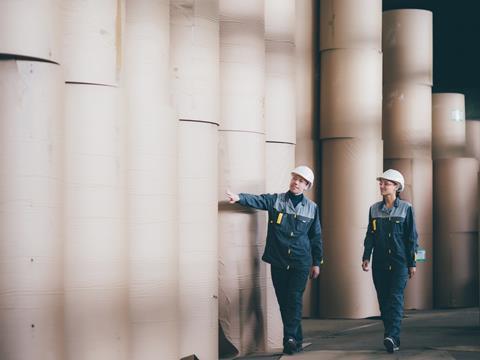
A collaboration between Cepi and the European Heat Pump Association (EHPA) is aiming to save 50% of energy used in paper manufacturing and assist its decarbonisation by implementing heat pumps into existing paper mills.
Heat pumps are said to provide around 10% of Europe’s final industrial energy demand and help lower the industrial emissions of multiple sectors. Large heat pumps and steam compressors capable of heating up to 200°C have recently become commercially available in a development expected to suit the needs of the pulp and paper industry.
Cepi’s Energy Efficiency Solutions Forum (EESF) is aiming to enable exchange and learning between front-running companies in the effort to implement sustainably minded technologies; it is hosting the joint working group of European paper and heat pump industrial players that has calculated a potential 50% in energy savings in the paper drying process with the usage of heat pumps.
A joint Cepi-EHPA paper has also detailed the ways in which heat pumps could be integrated into paper mills. The companies are now calling upon EU regulators to double down on the electrification of the paper and pulp industry, which will apparently require large amounts of affordable clean energy if it is to align with the EU Green Deal Industry Plan.
“When Cepi launched the Energy Efficiency Solutions Forum exactly three years ago, heat pumps were investigated but were not yet reaching high enough temperatures,” says Jori Ringman, director general at Cepi. “Through the candid collaboration between both sectorial associations, the technology now matches our needs. It will be an important building block in reducing the energy needs in the paper industry.
“The industry will continue doing its part in reducing energy consumption and heat pumps can play an important role in that. Combined with access to affordable fossil-free energy heat pumps will allow for a full transition towards a decarbonised and circular economy based on bio-products.”
“The progressive phase-out of the fossil fuel alternative in industrial applications will be essential to building a business case,” continues Thomas Nowak, secretary general at EHPA. “It will also be driven by high energy costs and the increasing CO2 price where clean energy clearly offers a beneficial solution.”
Adrien Hiel – a Brussels-based public affairs professional committee member of the Coalition for Energy Savings – previously identified heat pumps as an efficient tool for the decarbonisation of the papermaking process, yet expressed that the ‘slow development’ of such technology was ‘frustrating to watch’.
Meanwhile, a recent position paper by Cepi pushed for developments in legislation to reflect the needs of the paper and pulp industry and carry it closer to the EU’s net zero carbon goals. It followed similar calls to action from the organisation in securing affordable gas supplies and building a more resilient supply chain in the wake of Russia’s invasion of Ukraine.














No comments yet